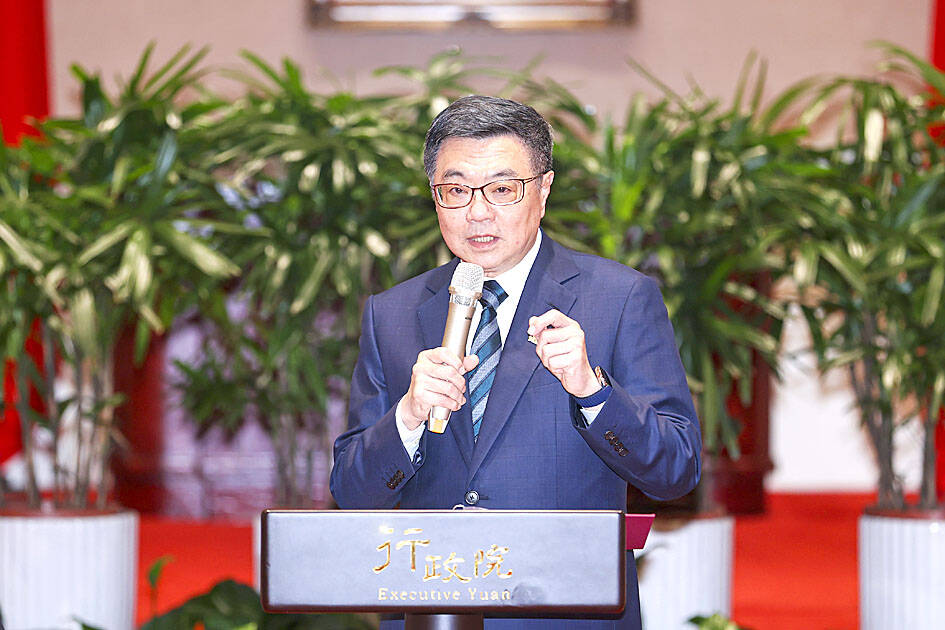The Legislative Yuan’s bill on pension reform, passed on Tuesday, violates legal procedures and would be hard to implement, Premier Cho Jung-tai (卓榮泰) said on Facebook on Tuesday evening.
The legislature passed an amendment to the Police Personnel Management Act (警察人員人事條例) stipulating that the pension for police and firefighters as well as coast guard, immigration and air corps personnel would be based on the retiree’s years of service.
Those who have served 15 years would have an income replacement ratio of 43.25 percent.

Photo: CNA
Those who have served 36 years would receive the maximum income replacement ratio of 80 percent.
The amendment also stipulates that the new replacement rate would apply to those who retired prior to the amendment’s implementation.
According to Article 91 of the Budget Act (預算法), legislators should seek approval from the Executive Yuan for bills that “largely increase annual expenditures or decrease annual revenues,” Cho said.
However, the legislature failed to fulfill these requirements, passing an amendment that causes a national fiscal gap and increases expenditures without consulting the Executive Yuan, Cho said.
The legislature’s forced amendment of the law violates legal principles and undermines previous negotiations on the central government’s budget, he said.
The Executive Yuan cannot accept this, and the bill would be hard to implement, he added.
According to the Ministry of Civil Service’s calculations, this amendment would cause the retirement fund to be exhausted two years earlier, Cabinet spokeswoman Michelle Lee (李慧芝) said.
It is estimated that over the next 50 years, the combined reduction in fund income and increase in expenditures would amount to more than NT$170 billion (US$5.17 billion), Lee said.
This fiscal gap would need to be covered by the Executive Yuan’s public service budget, meaning that taxpayers would bear this burden, she said.
The Executive Yuan would explore possible constitutional remedies in accordance with powers granted by the Constitution, she added.
Solely raising the replacement rate for police officers’ retirement income violates the constitutional principle of equality, which requires fair treatment of all members under the public service pension system, the Ministry of Civil Service said in a statement on Tuesday.
Police officers and other civil servants, including those in high-risk jobs, are subject to the same pension laws and contribute at the same rates, the ministry said.
Comparisons to the 90 percent ratio for military personnel are inappropriate, it said.
Even with a higher replacement ratio, military personnel’s actual monthly retirement income is lower than that of police officers of equivalent rank due to the military’s maximum service term limits, it said.

An essay competition jointly organized by a local writing society and a publisher affiliated with the Chinese Communist Party (CCP) might have contravened the Act Governing Relations Between the People of the Taiwan Area and the Mainland Area (臺灣地區與大陸地區人民關係條例), the Mainland Affairs Council (MAC) said on Thursday. “In this case, the partner organization is clearly an agency under the CCP’s Fujian Provincial Committee,” MAC Deputy Minister and spokesperson Liang Wen-chieh (梁文傑) said at a news briefing in Taipei. “It also involves bringing Taiwanese students to China with all-expenses-paid arrangements to attend award ceremonies and camps,” Liang said. Those two “characteristics” are typically sufficient

A magnitude 5.9 earthquake that struck about 33km off the coast of Hualien City was the "main shock" in a series of quakes in the area, with aftershocks expected over the next three days, the Central Weather Administration (CWA) said yesterday. Prior to the magnitude 5.9 quake shaking most of Taiwan at 6:53pm yesterday, six other earthquakes stronger than a magnitude of 4, starting with a magnitude 5.5 quake at 6:09pm, occurred in the area. CWA Seismological Center Director Wu Chien-fu (吳健富) confirmed that the quakes were all part of the same series and that the magnitude 5.5 temblor was

The brilliant blue waters, thick foliage and bucolic atmosphere on this seemingly idyllic archipelago deep in the Pacific Ocean belie the key role it now plays in a titanic geopolitical struggle. Palau is again on the front line as China, and the US and its allies prepare their forces in an intensifying contest for control over the Asia-Pacific region. The democratic nation of just 17,000 people hosts US-controlled airstrips and soon-to-be-completed radar installations that the US military describes as “critical” to monitoring vast swathes of water and airspace. It is also a key piece of the second island chain, a string of

The Central Weather Administration has issued a heat alert for southeastern Taiwan, warning of temperatures as high as 36°C today, while alerting some coastal areas of strong winds later in the day. Kaohsiung’s Neimen District (內門) and Pingtung County’s Neipu Township (內埔) are under an orange heat alert, which warns of temperatures as high as 36°C for three consecutive days, the CWA said, citing southwest winds. The heat would also extend to Tainan’s Nansi (楠西) and Yujing (玉井) districts, as well as Pingtung’s Gaoshu (高樹), Yanpu (鹽埔) and Majia (瑪家) townships, it said, forecasting highs of up to 36°C in those areas